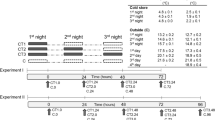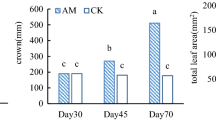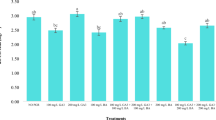Abstract
SUITABLE methods for extracting and identifying RNA from leaf tissues of deciduous trees are modifications of the Schmidt–Thannhauser technique1. Two such methods have been described2,3, one involving the use of 0.33 N potassium hydroxide for 18 h at 37° C, with the other extending the time to 20 h 0.57 N potassium hydroxide. Identification of UNA is made from spectrophotometric absorption at 260 mµ. after ion exchange purification.
This is a preview of subscription content, access via your institution
Access options
Subscribe to this journal
Receive 51 print issues and online access
$199.00 per year
only $3.90 per issue
Buy this article
- Purchase on Springer Link
- Instant access to full article PDF
Prices may be subject to local taxes which are calculated during checkout
Similar content being viewed by others
References
Schmidt, G., and Thannhauser, S. J., J. Biol Chem., 161, 83 (1945).
Diener, T., and Lasheen, A. M., Proc. Amer. Soc. Hort. Sci., 75, 195 (1960).
Kessler, B., and Engelberg, N., Biochim. Biophys. Acta., 55, 70 (1962).
Fleck, A., and Munro, H. N., Biochim. Biophys. Acta, 55, 571 (1962).
Author information
Authors and Affiliations
Rights and permissions
About this article
Cite this article
MILLIKAN, D., PICKETT, E. Relation between the Length of Exposure to Alkali and Yield of Ribonucleic Acid from Plant-leaf Tissue. Nature 200, 470–471 (1963). https://doi.org/10.1038/200470b0
Issue Date:
DOI: https://doi.org/10.1038/200470b0
This article is cited by
Comments
By submitting a comment you agree to abide by our Terms and Community Guidelines. If you find something abusive or that does not comply with our terms or guidelines please flag it as inappropriate.



